International Cooperation
- HOME
- International Cooperation
- NWEC Global Seminar
- FY2020 NWEC Global Seminar: Covid-19 and Gender
NWEC Global Seminar
- Event Report
-
FY2020 NWEC Global Seminar: Covid-19 and Gender
Date:December 4th, 2020
The National Women’s Education Center of Japan held the 2020 NWEC Global Seminar around the theme “Covid-19 and Gender: Effects of the Public Health Crisis on Gender Equality” from November 27 through December 4, 2020. In light of the global spread of Covid-19, this year’s seminar was divided in three parts and provided via video on demand (VOD) and live streaming.
●Part 1: Keynote Addresses(VOD streaming)
In Part I, measures taken in Taiwan and Iceland, countries that were successful in swiftly containing the new coronavirus, were introduced.
Taiwan
In an address titled “Crisis Management of COVID-19 from a Gender Perspective: Is Women Leadership the Key to Success?” Dr. Lilian Wang (Professor, Department of Social Work, National Taiwan University) analyzed factors behind the success of the “Taiwan Model” which, based on experience gained dealing with the SARS outbreak in 2003, involved implementation of strict national border control and establishment of a Central Epidemic Command Center. She also emphasized the widespread sharing of the values of equality and generosity in society (caring citizenship) demonstrated by Taiwan’s female leader. Dr. Wang concluded her address by identifying the need to collect and analyze data that includes gender statistics in order to formulate and implement gender-sensitive policies to prevent contagion.
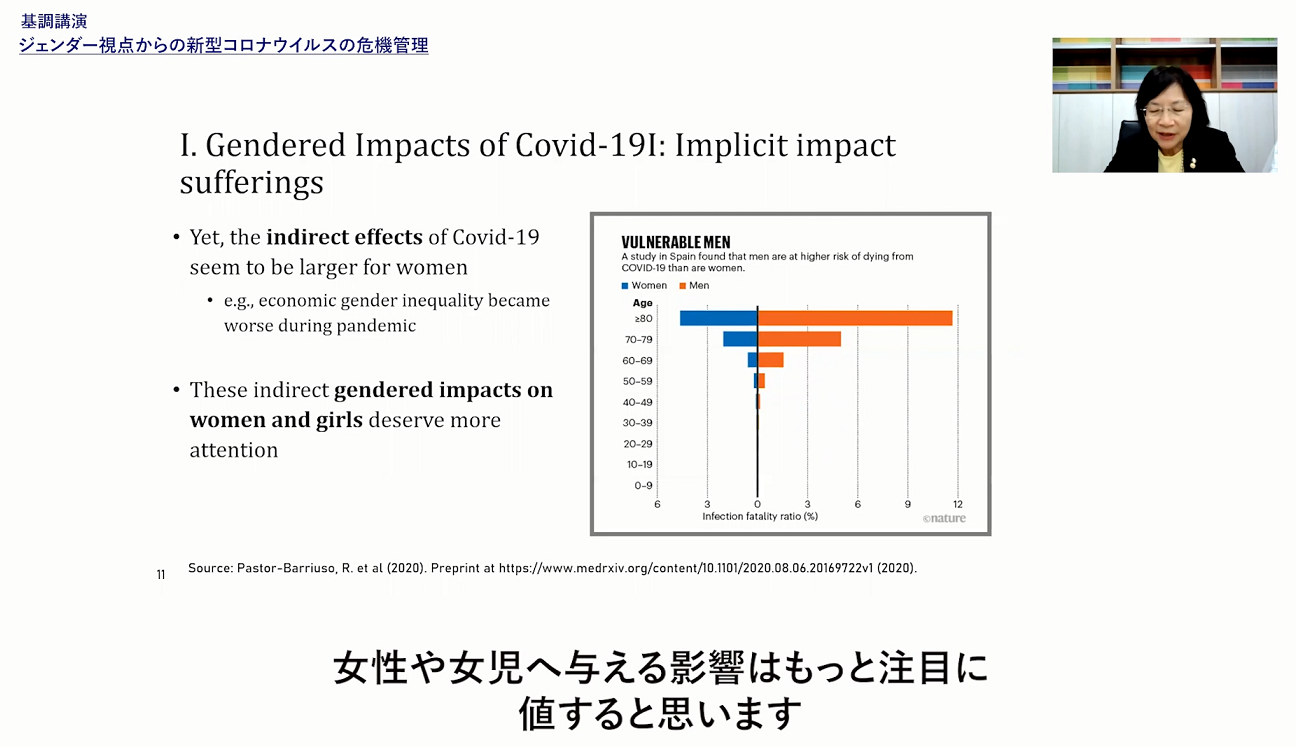
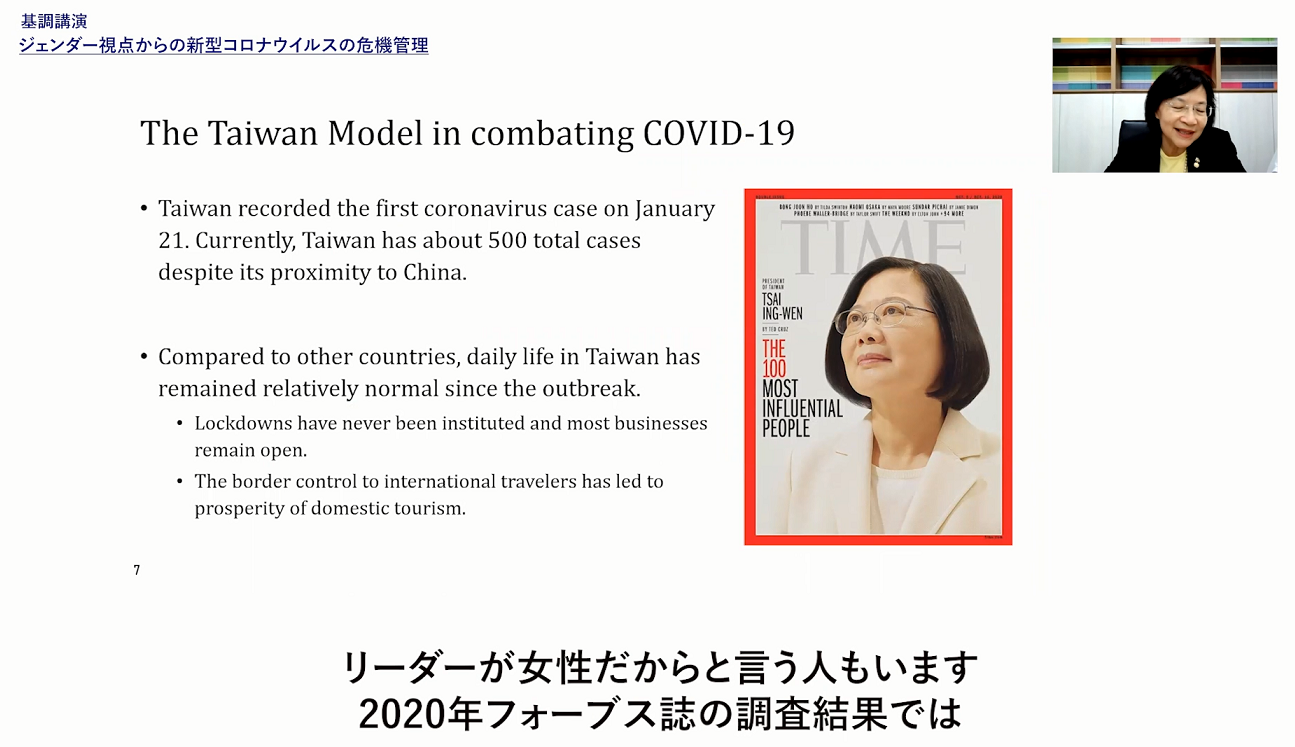
Iceland
In the second keynote, “Gender Equality and Women in the Time of Plague,” Ms. Brynhildur Heiðar-og Ómarsdóttir (Secretary General, Icelandic Women’s Rights Association) reported on Iceland’s experience. Ms. Ómarsdóttir proposed that Iceland was able to formulate measures precisely and swiftly in a public health crisis such as this pandemic because advances in women’s participation in the fields of economics and politics have ensured there is little gender disparity. Moreover, in order to build a society resilient to crisis, she advocated the need to further substantiate social infrastructure that considers gender, such as equal provision of paid parental leave to both men and women and establishment of a “universal daycare” system for children over the age of two.
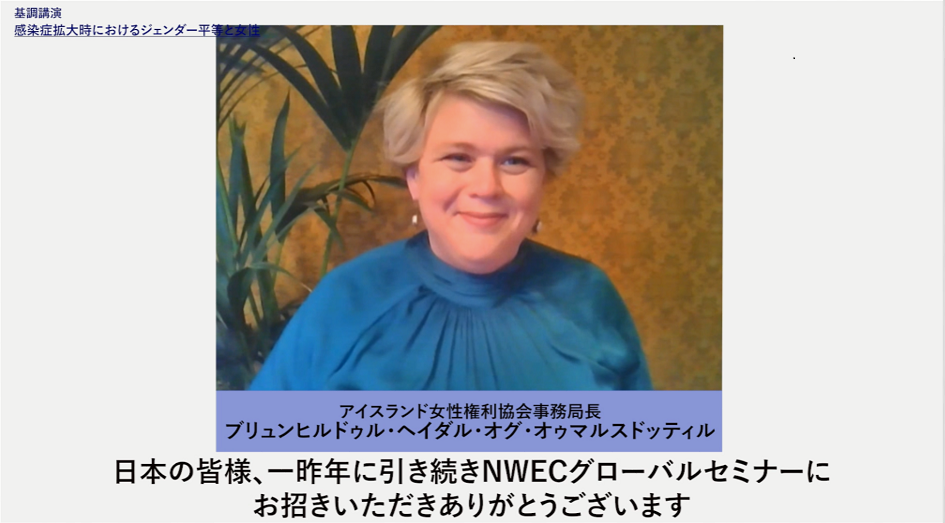
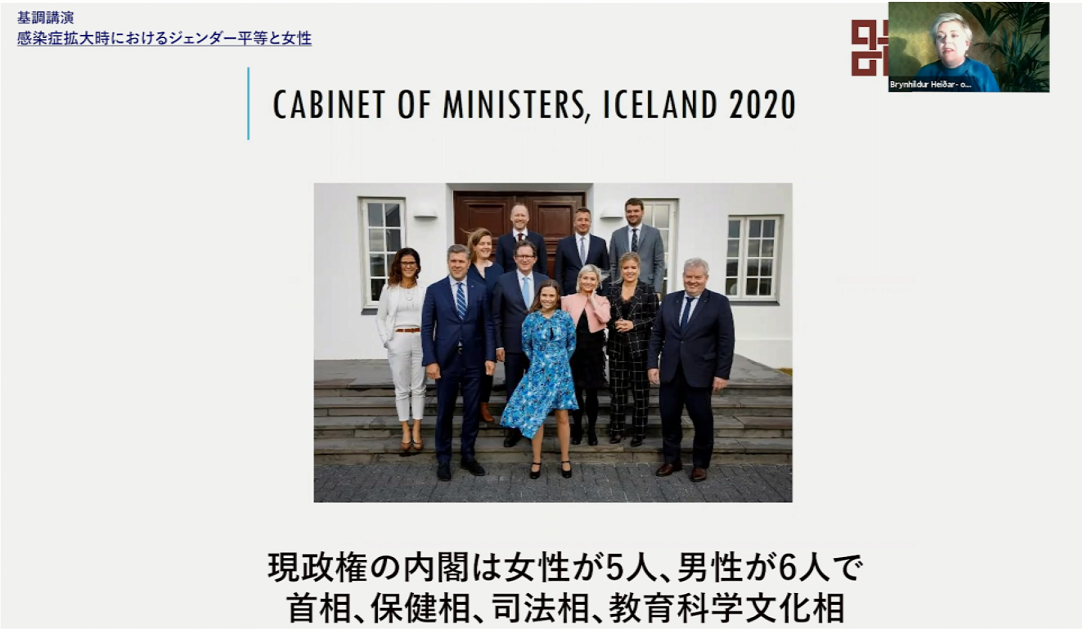
●Part 2: Country Reports(VOD streaming)
In Part 2, former participants from the NWEC Leader Seminar, an international training program conducted by NWEC for women leaders in Asia discussed gender issues that had come to light in Indonesia and Vietnam as they tackled Covid-19 and recommended necessary policies.
Indonesia
In Indonesia, gender roles within the family became more pronounced and the workload of unpaid household duties shouldered by women tended to increase with the spread of Covid-19. When schools shut down, mothers in households unable to furbish the expensive IT equipment and network environments needed to support children taking lessons remotely from home saw their workloads increase. Moreover, the fact that despite escalating violence against women and children, efforts to reduce contagion have resulted in diminished services for victims of violence was identified as a problem. It was also mentioned that small-scale women entrepreneurs working in the informal sector have limited access to public support due to the difficulty they experience completing necessary administrative procedures. Measures to address the needs of people facing complex difficulties such as households comprising elderly, single or disabled women are necessary.
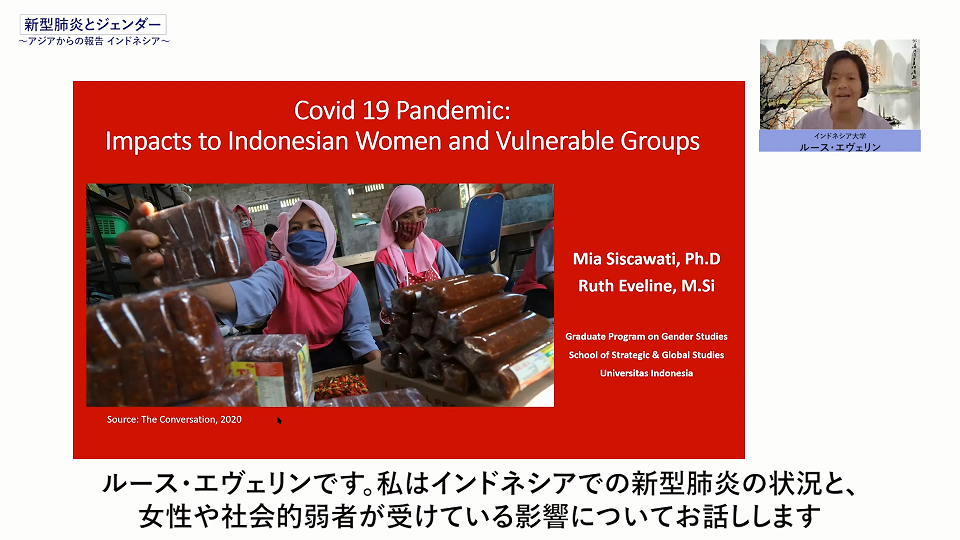
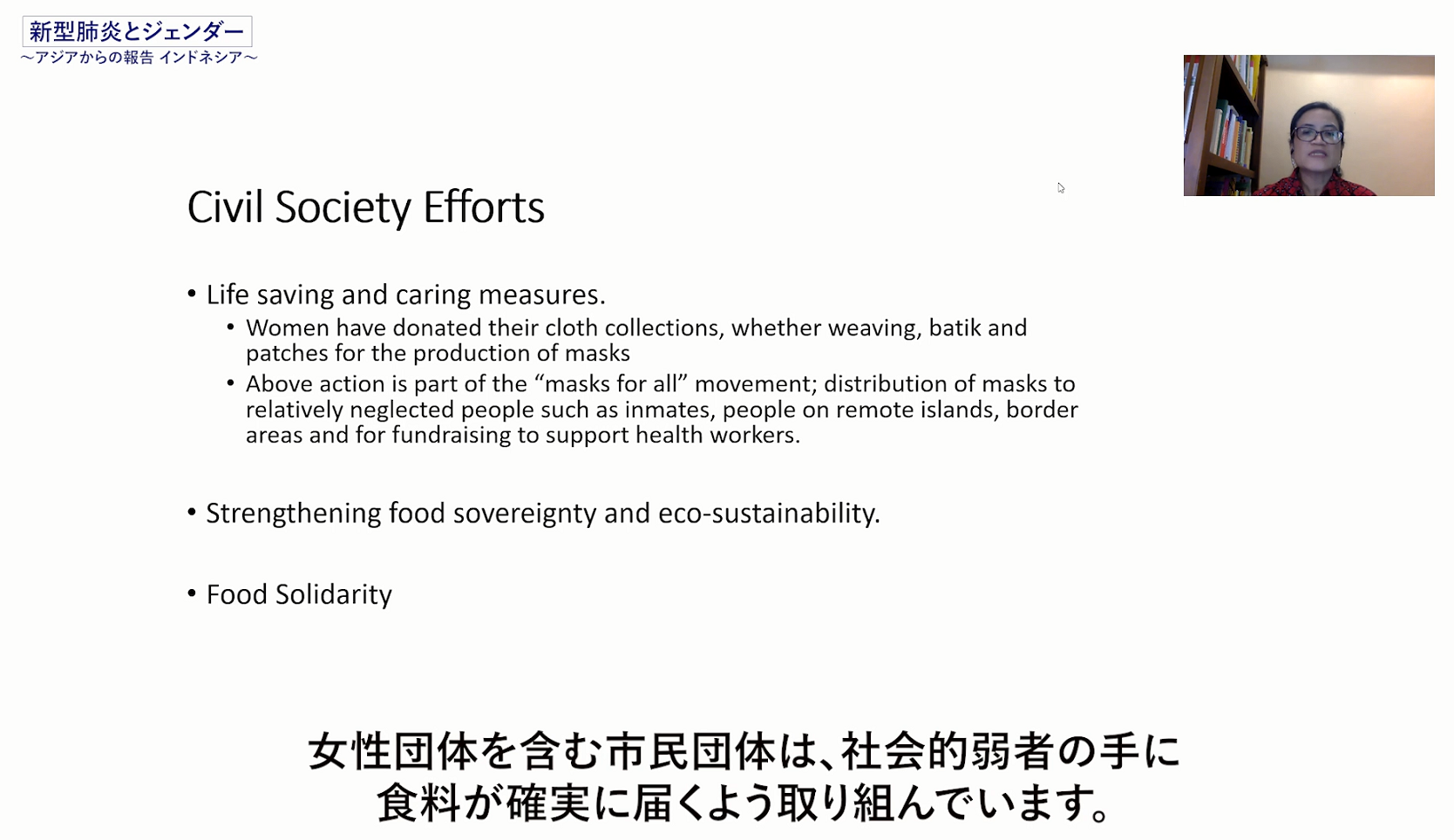
Vietnam
In Vietnam, women make up a large percentage of workers in sectors such as manufacturing, retail, scrap collecting, housekeeping, and beauty salons that were heavily affected by the coronavirus pandemic. Women are playing a growing role as caregivers in both public and private arenas. Women account for more than 60 percent of health workers, and as in Indonesia, many women feel their domestic workload has increased. When schools closed between February and mid-May 2020, it was mostly mothers who shouldered the burden of helping children study at home. The report also mentioned an initiative known as “No one will be left behind” which collects donations and sets up “rice ATMs” that provide rice free of charge (for the unemployed) in Vietnam.
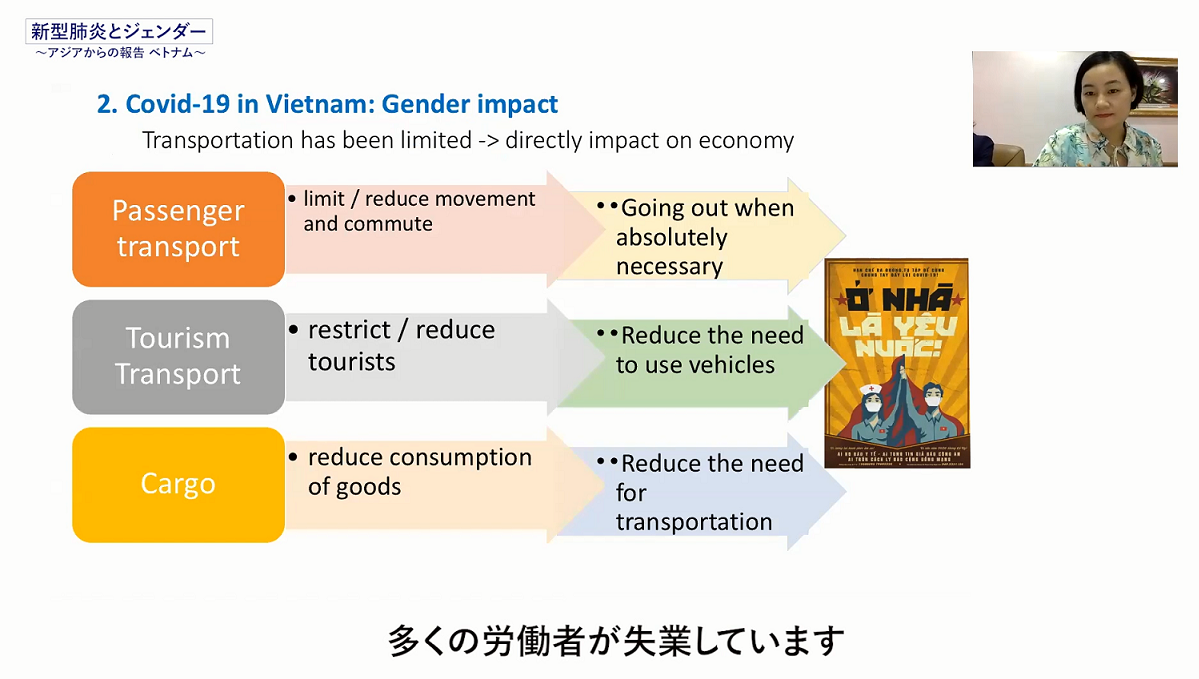
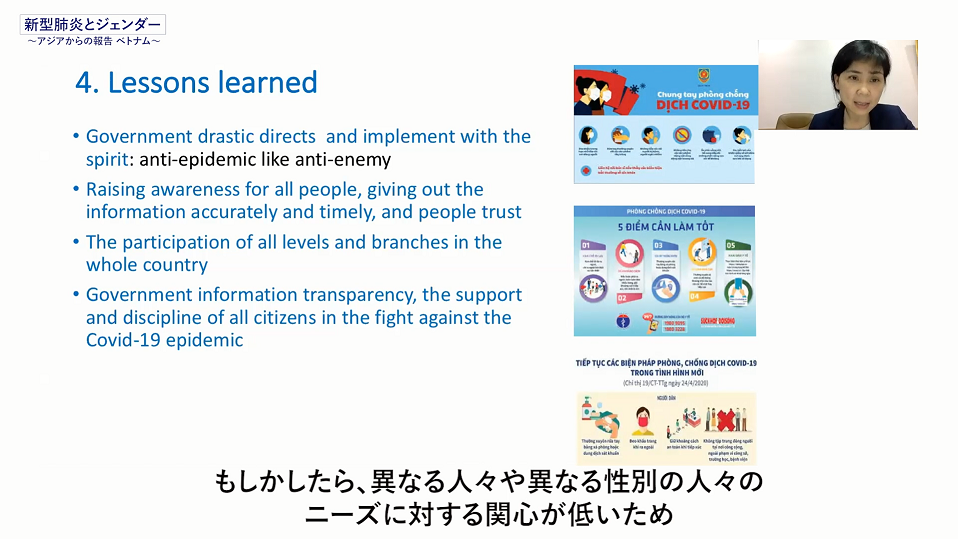
●Part 3: Panel Discussion(Live streaming)
The panel discussion comprised three reports around the theme “Covid-19 and Gender” that were presented by Japanese intellectuals and a discussion.
The coordinator, Ms. Atsuko Miwa (Director, Asia-Pacific Human Rights Information Center ) initiated the discussion by pointing out that, based on the reports on Taiwan, Iceland, Indonesia and Vietnam presented in Parts 1 and 2, Covid-19 had revealed various issues that had remained hidden, notwithstanding their existence hereto, and other neglected gender issues, and that inequalities, disparities and injustices maldistributed in society had grown.
Ms. Chieko Akaishi (Head Director of the NPO Single Mothers Forum) started her report entitled “Effects of Covid-19 on single-mother households” by introducing a questionnaire her organization conducted in April 2020. This had revealed that many single mothers economize on the cost of utilities and meals to compensate for reductions in income by drinking water from water fountains in parks and reducing the frequency of meals and baths. A study entitled “Effects of Covid-19 on single mothers’ employment and lifestyle” conducted in July revealed that 70 percent of single mothers had responded their incomes had been impacted by changes in employment and work conditions, and reductions in the number days and hours they worked. It also showed that an increasing number of employers were telling staff to wait at home, restricting the number of days they worked, laying them off temporarily, or dismissing them. Given current advances in digitalization and the financial difficulties facing single-mother households, Ms. Akaishi advocated the need for providing PCs and support for single mothers’ acquisition of IT skills as a means of helping them find employment.
This was followed by a report entitled “Women’s Labor in the Pandemic: From ‘Husband = Safety Net’ to Public Safety Net” by Ms. Mieko Takenobu (Journalist and Professor Emerita of Wako University) in which she insisted the spread of Covid-19, which has hammered the face-to-face service sector and non-regular workers, is causing female non-regular workers to be left behind. Women account for 70 percent of non-regular workers in Japan. Non-regular workers who get paid by the hour at workplaces where work and shifts were reduced as a result of the public being asked to refrain from going out were told they were not eligible for an allowance for the leave (although they were actually eligible) by employers who shy away from cumbersome procedures. Moreover, work unions are being inundated with consultations claiming employers required non-regular workers to go to work while encouraging regular workers to work remotely. Ms. Takenobu pointed to the lack of public safety nets as a factor behind this. She also alluded to the traditional idea of “Husband = Safety Net” which is based on gender biases such as “Part-timers merely supplement family budgets” and “Loss of income doesn’t adversely affect married women,” and the limits of the traditional work model whereby women are responsible for housework, child raising and caregiving and a “carefree person (man = husband)” doesn’t have to do any unpaid household chores within the home. Ms. Takenobu concluded her report by stressing the need to improve social welfare for non-regular female workers; provide gender education for case workers and labor standard supervisors; and review compensation for non-regular government officers.
The final speaker was Mr. Satoru Yuyama (Senior Program Officer, Civil Society Partnership Group: Japanese Organization for International Cooperation in Family Planning (JOICFP)). JOICFP is an international NGO that works to protect women’s lives and well-being. With regard to Covid-19’s impact on women, Mr. Yuyama pointed out that although women account for the majority of caregivers and healthcare workers who face a high risk of catching Covid-19, and that funds are being funneled into coronavirus countermeasures, insufficient funds were available for sexual reproductive health services pertinent to women’s well-being such as adequate pre- and postnatal care for women, contraception and safe pregnancy termination procedures. He also expressed his concerns about increases in consultations regarding postnatal depression and teenage pregnancy observed as the pandemic continues to spread.
With regard to support for Covid-19 countermeasures in developing countries, JOICFP has been providing personal protective equipment (masks, hand sanitizers, etc.) for healthcare practitioners and community health workers in Zambia, and developing cellphone-based advocacy activities to prevent infection in Ghana. Moreover, to enable women in Japan to become pregnant, give birth and raise children with peace of mind, it has been providing online mothering classes and operating a “Mother First” postnatal carehouse as one element of pre- and postnatal care. Mr. Yuyama also identified the need to deepen ties with midwives, public health workers and other specialists who support women in order to mitigate the impact Covid-19 is having on women.
The experts’ reports were followed by an open discussion where a lively debate ensued with participants sharing numerous questions and opinions, including “Once again I was stunned by the severity of the situation facing single mothers and female non-regular workers in Japan” and “Learning about the situation overseas gave me new insight into how Covid-19 is affecting gender.”
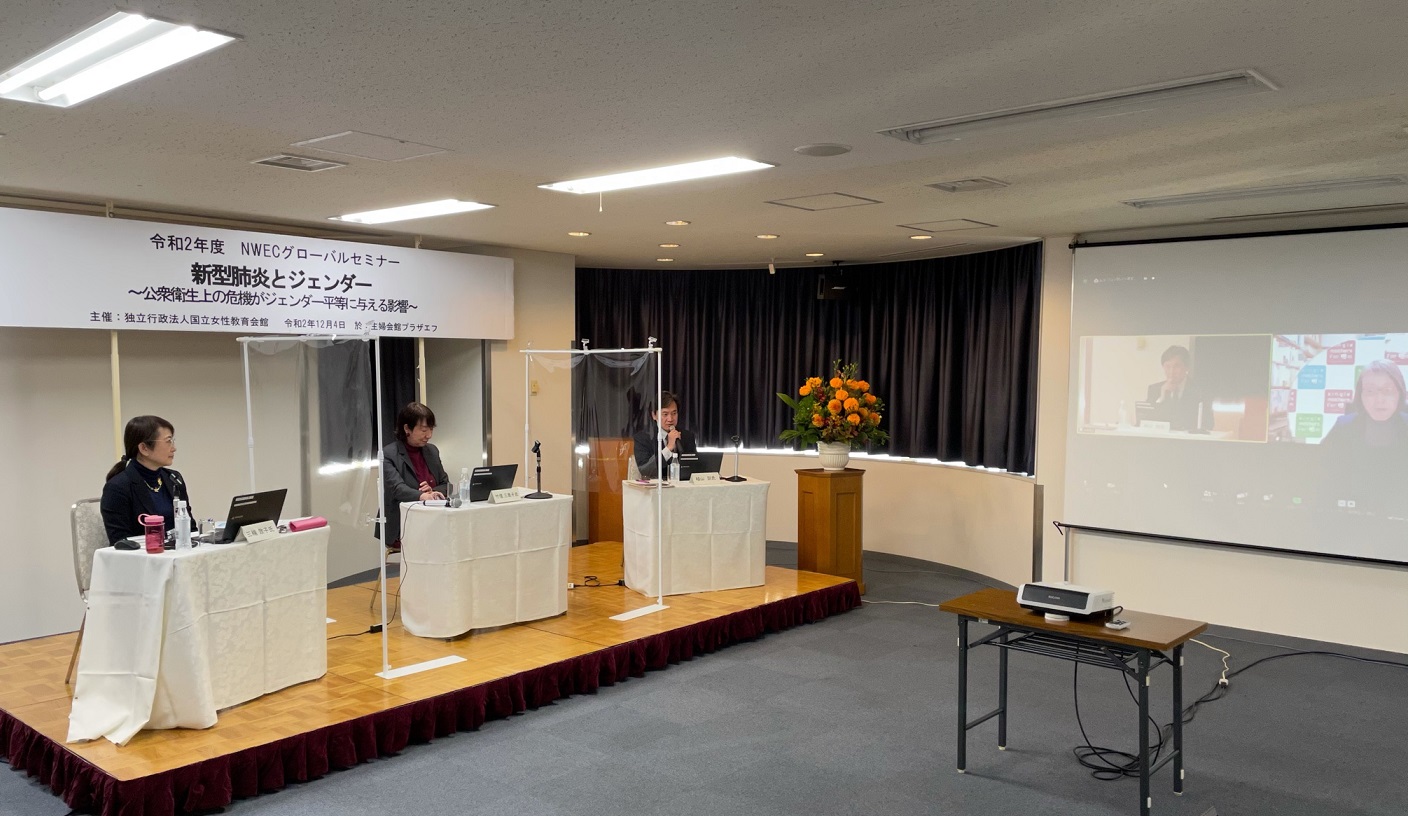
Seminar Handouts
International Cooperation
- International Seminar
- FY2019 Seminar for Gender Equality Officers and Women Leaders in the Asia Region
- FY2018 Seminar for Gender Equality Officers and Women Leaders in the Asia Region
- FY2017 Seminar for Gender Equality Officers and Women Leaders in the Asia Region
- FY2016 Seminar for Gender Equality Officers and Women Leaders in the Asia Region
- FY2015 Seminar for Gender Equality Officers and Women Leaders in the Asia Pacific Region
- FY2014 Seminar for Gender Equality Officers and Women Leaders in the Asia Pacific Region
- FY2013 Seminar for Gender Equality Officers and Women Leaders in the Asia Pacific Region
- FY2012 Seminar for Gender Equality Officers and Women Leaders in the Asia Pacific Region
- FY2011 Seminar for Gender Equality Officer and Women Leaders in the Asia Pacific Region
- FY2010 Empowerment Seminar for Women Leaders in the Asia Pacific Region
- FY2009 Empowerment Seminar for Women Leaders in the Asia Pacific Region Final Report
- FY2008 Empowerment Seminar for Women Leaders in the Asia Pacific Region
- FY2007 Empowerment Seminar for Women Leaders in the Asia Pacific Region
- FY2006 Empowerment Seminar for Women Leaders in the Asia Pacific Region
- NWEC Global Seminar
- FY2025 NWEC Global Seminar: Addressing Technology-Facilitated Gender Based Violence (TFGBV): Approaches to Eradicate the Invisible Harm
- FY2024 NWEC Global Seminar: Gender Equality and Care
- FY2023 NWEC Global Seminar: Gender Mainstreaming & Strengthening Institutional Mechanism with Gender Perspective
- FY2022 NWEC Global Seminar: Does Digital Technology Advance Gender Equality?
- FY2021 NWEC Global Seminar: Combating Gender-Based Violence – “Building Back Better” from the Covid-19 Crisis
- FY2020 NWEC Global Seminar: Covid-19 and Gender
- FY2019 NWEC Global Seminar: Gender and Media
- FY2018 NWEC Global Seminar: Promotion of the Advancement of Women - What Japan can learn from Iceland about Gender Equality?
- FY2017 NWEC Global Seminar: Promotion for Advancement of Women Lessons from Germany
- FY2016 NWEC Global Seminar: Promotion for Advancement of Women –Lessons from Europe
- FY2015 International Symposium: Gender Equality and Women's Empowerment
- FY2014 International Symposium: Keys to Diversity and Women's Leadership
- FY2013 NWEC International Symposium:Gender Equality for Men
- FY2012 NWEC International Symposium:To Make a Society without Violence against Women a Reality
- FY2011 NWEC International Symposium
- FY2010 International Forum for Women's Empowerment
- FY2009 International Forum for Women's Empowerment
- FY2008 International Forum for Women's Empowerment Final Report3
- FY2008 International Forum for Women's Empowerment Final Report2
- FY2008 International Forum for Women's Empowerment Final Report1
- Cooperation with JICA
- FY2025 Knowledge Co-Creation Program (KCCP): "Promotion of Global Networking on Anti-Trafficking in Persons"
- FY2025 Knowledge Co-Creation Program "Eradicating Sexual and Gender-Based Violence (SGBV)"
- FY2025 Knowledge Co-Creation Program: Bangladesh “Strengthening Capacity to Address Gender-Based Violence"
- FY2024 Knowledge Co-Creation Program on "Promotion of Global Networking on Anti-Trafficking in Persons"
- FY2024 Knowledge Co-Creation Program "Eradicating Sexual and Gender-Based Violence (SGBV)"
- FY2023 Knowledge Co-creation Program "Promotion of Networking among ASEAN Countries on Anti-Trafficking in Persons”
- FY2023 Knowledge Co-Creation Program "Eradicating Sexual and Gender-Based Violence (SGBV)"
- FY2022 Knowledge Co-creation Program "Promotion of Networking among ASEAN Countries on Anti-Trafficking in Persons”
- FY2022 Knowledge Co-Creation Program "Eradicating Sexual and Gender-Based Violence (SGBV)"
- FY2021 Knowledge Co-creation Program "Promotion of Networking among ASEAN Countries on Anti-Trafficking in Persons”
- FY2020 Knowledge Co-creation Program "Promotion of Networking among ASEAN Countries on Anti-Trafficking in Persons”
- FY2019 Knowledge Co-creation Program "Promotion of Networking among ASEAN Countries on Anti-Trafficking in Persons”
- FY2018 Knowledge Co-creation Program "Promotion of Networking among ASEAN Countries on Anti-Trafficking in Persons”
- Issue-specific Training “Seminar on Promotiom of Networking among ASEAN Countries on Anti-Trafficking in Persons”
- Basic Information-Gathering Survey/Workshop Seminar on the Economic Independence for Women in Central America and the Caribbean (El Salvador/Dominican Republic)
- Regional Gender Seminar in Central and South America
- 2015 Issue-specific Training "Seminar on Promotion of Networking among Asian Countries on Anti-Trafficking in Persons"
- Seminar on the Promotion of Education for Girls and Women II
- International Conference/International Exchange
- Online meeting with Seisen International School elementary students
- Visitor: Mansfield Fellows
- Visitor:JICA Knowledge Co-Creation Program (KCCP) on "Women's Empowerment through Business for Central American Integration System (SICA) Member Countries"
- The 68th Session of the Commission on the Status of Women
- Visitor: Madam Sustjie Mbumba, First Lady of the Republic of Namibia
- Workshop of commemorating the donation of the Beate Shirota Gordon archive materials
- Meeting with Korean Women’s Development Institute (KWDI)
- The Coalition of Finnish Women's Associations (NYTKIS) Secretary General Ms. KAKKOLA’s Courtesy Call to Foreign Minister KAMIKAWA
- The Coalition of Finnish Women's Associations (NYTKIS) Secretary General Ms. KAKKOLA’s Japan Visit Program
- The 67th Session of the Commission on the Status of Women
- NGO CSW67 Forum
- Webinar with Korean Women’s Development Institute (KWDI)
- The 66th Session of the Commission on the Status of Women (Hybrid format)
- Online meeting with international graduate students from the Appropriate Technology course at the University of Tsukuba
- The 65th session of the Commission on the Status of Women
- Lecture "The Beate Sirota Gordon Archives at Mills College"
- Participation in 2nd AGenT
- The 64th session of the Commission on the Status of Women
- Dr. Wang from National Taiwan University visits NWEC
- Japan Network of Women Engineers and Scientists and The Japan Inter-Society Liaison Association Committee for Promoting Equal Participation of Men and Women in Science and Engineering: 9th Japan Korea China Women Leaders Forum for Science & Technology
- Researcher from the KWDI visits NWEC
- Visit by a delegation from the Socialist Republic of Vietnam Ministry of National Defense
- Briefing on the Reykjavik Index for Leadership
- Women's Archives Center Exhibition "Beate Sirota Gordon and gender equality in Japanese Constitution"
- Visit from the Guangxi Women’s Federation
- Participation in the 63rd Session of the Commission on the Status of Women
- 7th Global Forum on Gender Statistics
- FY2018 International Symposium hosted by Korean Institute for Gender Equality Promotion and Education “Gender Equality at Schools”
- Visit from All-China Women’s Federation(ACWF)
- Participation in the 62nd Session of the Commission on the Status of Women
- The 14th KIGEPE International Symposium “Empowering Women’s Leadership: expanding influence and innovation”
- Participation in the 61st Session of the Commission on the Status of Women
- Visit from the Batis Center for Women
- 2011 Asia Women Eco-Science Forum (a forum of science and engineering leaders in Japan, China and Korea)
- The 60th Session of the Commission on the Status of Women
- The 59th Session of the United Nations Commission on the Status of Women
- The 58th Commission on the Status of Women
- The 57th Session of the United Nations Commission on the Status of Women
- International Symposium: Gender Awareness Education for Sustainable Development
- Thirtieth Anniversary Programs
- Attendance at the Ceremony Commemorating the 25th Anniversary of the Korean Women’s Development Institute (KWDI)
- Japanese-Filipino children (JFC)* from the Philippines-based NGO “DAWN” visit the Center
- Visitors from Abroad to NWEC
- Research report on Multicultural Family Support in South Korea
- Workshop on Gender and Education: Life-long Learning for Women’s Empowerment
- Lecture Delivered by a Visiting Researcher
- Connections: Bringing Together the Next Generation of Women Leaders in Science, Technology, Engineering and Mathematics
- Conclusion of Memorandum of Understanding on Exchange and Cooperation with the Ministry of Women's Affairs, Royal Government of Cambodia
- Visit to Japan by the Minister of Women’s Affairs of the Royal Government of Cambodia
- KIGEPE Delegation Visit
- Officials of Ministry of Information and Communications of the Socialist Republic of Vietnam visited NWEC
- The 56th Commission on the Status of Women
- Dr. Barker's visit
- Multidisciplinary Intellectual Exchange for Women Leaders from the United States, Japan, South Korea and the Philippines
- Courtesy visit to University of Hawai`i
- Delegation of Board for the Advancement of Women, Ministry of Finance of the Socialist Republic of Vietnam visited NWEC
- Visit Korean Women's Development Institute (KWDI)
- Report on Participation in the 5th World Social Forum on Migration
- A group led by the Vice President of the Korean Women's Development Institute visited NWEC
- A disaster management specialist from India visits the Center
- Visit to the Korean Institute for Gender Equality Promotion & Education (KIGEPE) and others
- Secretary of State, Ministry of Justice, Kingdom of Cambodia visited NWEC
- Research conducted in the Republic of the Philippines
- Research on the Comparative Study of the Gender Equality Policy in Southeast Asian Countries in the Kingdom of Cambodia
- Ochanomizu University and A Canadian Women’s Study Researcher visited NWEC
- Aigyung Yang, Research Fellow and Former Director of Strategy Board for Women Friendly Policies of the Korean Women's Development Institute (KWDI) Visits NWEC
- Delegation of the Ministry of Defense of the Socialist Republic of Vietnam visited NWEC
- Delegation from the Women and Development Center, of the Vietnam Women's Union, Visited NWEC
- The "7th Asia-Pacific Forum on Development and Gender" was held in Seoul, South Korea
- HOME
- International Cooperation
- NWEC Global Seminar
- NWEC Global Seminar
- FY2020 NWEC Global Seminar: Covid-19 and Gender


